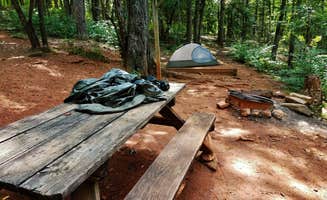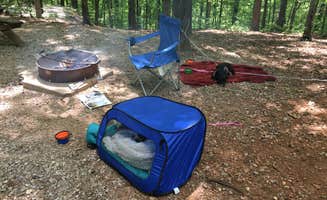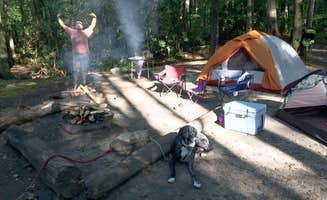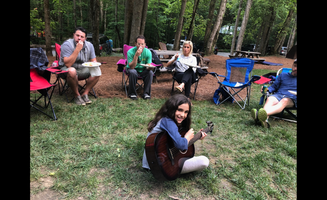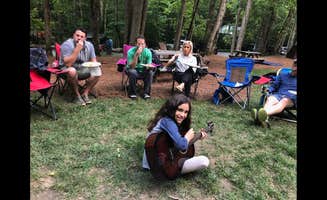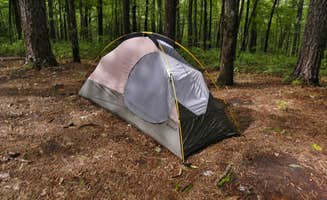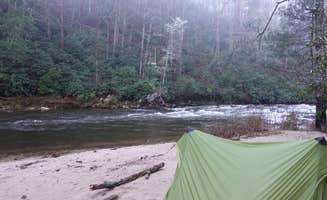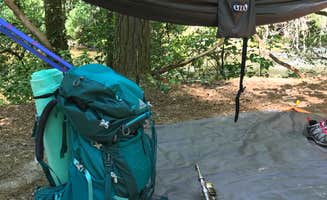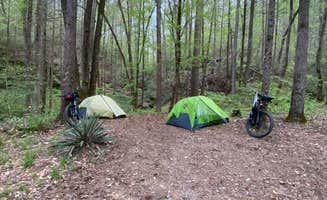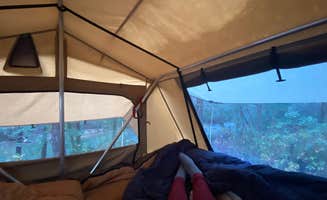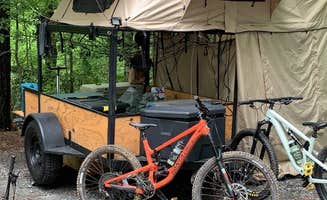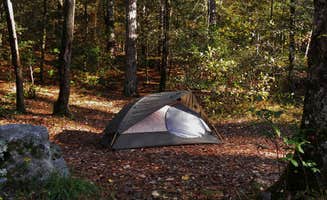Tent camping near Easley, South Carolina sits within the Blue Ridge Mountain foothills, where elevations range from 1,000 to 3,000 feet throughout the camping region. The area experiences mild spring and fall temperatures between 50-75°F, making these seasons ideal for overnight wilderness stays. Winter camping remains viable with proper gear as temperatures rarely drop below 20°F, though summer humidity can make July and August camping more challenging.
What to do
Waterfall hikes: Several campgrounds connect to waterfalls within short hiking distances. At Burrells Ford, campers can access King Creek Falls via a half-mile trail across a log footbridge. "The trail to the waterfall is over a half mile (my estimation), and you have to cross a log footbridge. There was a huge downed tree that you also have to cross, but you have to be careful since the log was slimy," notes one reviewer.
Trout fishing: The Chattooga River offers excellent fishing opportunities directly accessible from several campsites. "Good amount of camping with a short hike in. Sites are right on the Chatooga River. This river is stocked with trout. Fishing license is required but both SC and GA are acceptable as the river is the state line," explains a Burrells Ford visitor.
Technical trail hiking: For experienced hikers, Mountain Bridge Wilderness Area Trailside Camping connects to challenging routes with climbing elements. "Wonderful trails with breath taking views and technical climbs plus discrete camping," writes one camper. Another adds, "I strongly suggest wearing waterproof hiking boots/trail runners as there is lots of water on the trail and because the Dismal Trail is a steep climb to the lookout."
What campers like
River proximity: Many tent sites sit directly along waterways, creating both scenic views and soothing sounds. At Jones Gap State Park Campground, campers appreciate riverside locations. "Gorgeous site, a bit chilly by the river but beautiful and close enough to still use the park bathrooms! Sites are large and have varying degrees of privacy," reports one visitor.
True site separation: Unlike conventional campgrounds, the tent sites throughout this region offer significant distance between neighbors. One reviewer of Jones Gap State Park noted, "Each spot is about a quarter mile from the next, so you feel like you have the mountain to yourself," while another mentioned that the campsites are "all hike in. Not far, but not car camping at all."
Forest immersion: Jocassee Gorges Wildlife Management Area offers densely forested camping with minimal development. "Clean and clear water like we haven't experienced before. Beautiful water falls! Also Nicely taken care of facilities!" writes one visitor. Another adds, "There are so many campsite available through Jocassee. Currently my favorite campsites lie off of the Canebrake Trail and connect with the Foothills Trail."
What you should know
Carrying gear requirements: Many sites require hikers to transport all supplies from parking areas. At Pine Point Primitive Campground, "The hike is an easy half mile, on a trail, with slight ups and downs. I don't recommend rolling anything down the trail (no stroller, wagon, etc.) but instead, be ready for a short walk."
Water supply planning: Most primitive sites lack water hookups. As one Pine Point camper advises, "It is advisable to take your own water since the nearest water is almost a half mile away." Another notes that you need to "pack everything in and pack everything out."
Weekend capacity limitations: During peak periods, especially summer weekends and spring breaks, campgrounds fill quickly. A Burrells Ford visitor explained, "During peak season (summer, Spring Break) it will be slightly crowded, but there's usually still room to camp and it doesn't normally get rowdy or loud. Fishing will of course be inhibited when it's crowded."
Fire preparation: Damp conditions can make firewood gathering difficult. "It made it easy to gather firewood, but the wood was wet because of the recent rains," notes one Burrells Ford camper. Another mentions, "If there has been a lot of camper traffic, it will be difficult to find firewood. Firewood is available to purchase all along the road."
Tips for camping with families
Short-distance sites: For families with young children, select closer walk-in sites. At Asbury Hills Summer Camps, "My favorite thing about the boy/Girl Scout campsites was that it was along a river and was very large. It would be a great campsite for those who have a big group or just like the space."
Pet considerations: Some areas have challenging terrain for dogs. An Asbury Hills visitor warned, "My word of advice is to not take dogs that can't swim across the river; we saw a few couples who struggled to carry their pooches across the cable."
Age-appropriate sites: Jones Gap offers sites at varying distances. "Love the privacy of this spot (#8) which is the closest walk in spot from the Parking area. We were able to hike in a ton of gear (coolers, dog bed, etc (with a little work and a few trips) and it was worth it for the seclusiveness. Having both toddler and dog we knew we couldn't go far but this still felt like we were in the middle of nowhere."
Tips from RVers
Alternative field camping: Traditional RVs can find space at Denver Downs Farm, which offers a different experience than forest camping. "This is a farm and outdoor event center with a 140 acre field you can camp in. Very well maintained. There are no defined campsites we could see. Just a giant field to set up and camp."
Access limitations: Most wilderness areas near Easley restrict large RVs. One visitor to Jocassee Gorges noted it's "Not big rig friendly. Small campground loop. Forested and moderately strenuous hiking trails."
Self-sufficient setups: RV campers need to prepare for minimal services. The Denver Downs reviewer explained, "There is no water or any hookups. You will need to pack in and pack out everything."


